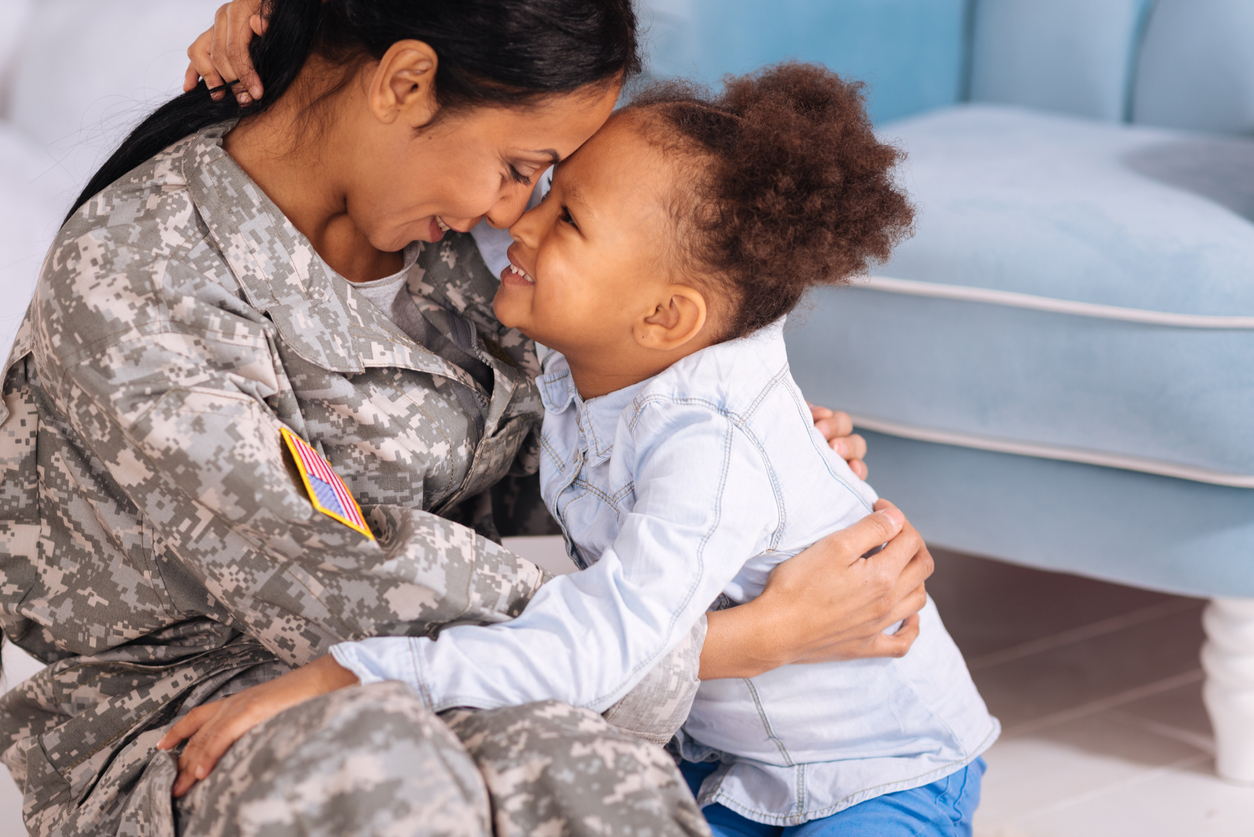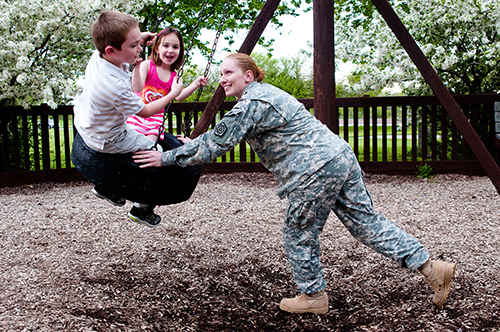What Are Effective Parenting Tactics During Military Deployments?
During military deployments, use virtual communication platforms for family check-ins, maintaining routines, and offering emotional support. Establishing stability through consistent daily schedules and involving children in planning can help. Prioritize self-care to manage separation stress, seek community resources, and create care packages and family traditions for connection. Building trust within the family, seeking community support, and maintaining open communication are crucial. Additionally, prepare for post-deployment reintegration by approaching readjustment with patience and engaging in family bonding activities. These tactics can help navigate the challenges of military deployments while ensuring your family stays connected and supported.
Key Takeaways
- Maintain consistent routines for stability and predictability.
- Utilize technology for regular family check-ins and emotional support.
- Encourage children to express emotions and engage in positive coping strategies.
- Prioritize self-care practices to manage separation stress effectively.
- Seek community support for understanding, belonging, and practical assistance.
Family Communication Strategies

Maintaining open lines of communication is crucial to fostering strong family connections during military deployments. Utilizing virtual communication platforms for regular family check-ins can help bridge the physical gap and strengthen emotional bonds. Technology plays an essential role in enhancing family bonding despite the distance.
Video calls, messaging apps, and social media platforms offer avenues for real-time interactions, sharing daily experiences, and providing emotional support.
During deployments, incorporating technology into daily routines can create a sense of togetherness and normalcy. Setting up virtual family activities like movie nights, online games, or virtual dinners can help maintain a sense of unity.
Additionally, utilizing shared online calendars for scheduling calls, virtual events, or important family milestones can aid in staying connected and organized.
Maintaining Routines and Structure

Establishing consistent daily routines and structure can provide stability and predictability for children and families coping with the challenges of military deployments. During these uncertain times, maintaining consistency and stability through daily routines and schedules is vital for children’s well-being.
Research shows that children thrive in environments where they know what to expect each day, especially when a parent is deployed.
Setting regular mealtimes, bedtime routines, and designated homework hours can help create a sense of normalcy amidst the upheaval of deployment. Encouraging children to participate in activities they enjoy and that align with their usual schedule can also aid in maintaining stability.
Additionally, involving children in the planning of these routines can empower them and provide a sense of control during a time of change.
Emotional Support for Children

To safeguard your children’s emotional well-being during military deployments, providing consistent emotional support is essential in helping them navigate the challenges they may face. Parent-child bonding plays a significant role in fostering resilience and emotional well-being in children during these tough times.
Maintaining open communication channels, expressing love and reassurance, and actively listening to your children’s feelings are important components of emotional support.
During deployments, children may experience feelings of anxiety, fear, and confusion due to the absence of a parent. By building a strong foundation of trust and security through parent-child bonding before the deployment, children are better equipped to cope with the separation.
Encouraging children to express their emotions, validating their feelings, and involving them in positive coping strategies like journaling or engaging in hobbies can help them process their emotions effectively.
Coping Mechanisms for Parents
During military deployments, it’s essential for parents to prioritize their own well-being by implementing effective coping mechanisms to navigate the challenges of separation and stress.
Self-care practices play an important role in helping parents manage the emotional toll of being apart from their partners in the military. Engaging in activities that promote relaxation, such as meditation, exercise, or hobbies, can provide much-needed relief from the stress of deployment.
Additionally, seeking support through parenting workshops can offer valuable insights and strategies for coping with the unique difficulties that arise during this time. These workshops can provide a sense of community and understanding, helping parents feel less isolated in their experiences.
Counseling services are also invaluable resources for parents struggling with the emotional impact of separation, offering a safe space to process feelings and develop healthy coping mechanisms.
Utilizing Community Resources
During military deployments, accessing community resources can provide essential support for you and your family.
Community support networks offer a sense of belonging and understanding during challenging times.
Childcare assistance programs and emotional counseling services can help alleviate some of the stress associated with parenting solo while your partner is deployed.
Community Support Networks
Engaging with local community support networks can greatly enhance your ability to navigate the challenges of parenting during military deployments. Seeking peer support within military families can provide a sense of understanding and camaraderie during these demanding times. By connecting with others who are going through similar experiences, you can share insights, tips, and emotional support that can be invaluable in helping you cope with the unique stressors of parenting while your partner is deployed.
Community support networks often offer various resources tailored to military families, such as counseling services, support groups, and social events. These avenues not only provide practical assistance but also create a sense of belonging and solidarity within the military community.
Additionally, reaching out to local organizations and military family support groups can offer access to information on available services like childcare assistance programs, educational workshops, and financial assistance, further easing the burden of solo parenting during deployments. Remember, you aren’t alone, and utilizing these community resources can make a significant difference in your parenting journey.
Childcare Assistance Programs
Utilizing childcare assistance programs offered through community resources can provide essential support for military families managing the challenges of parenting during deployments. These programs can be a lifeline for military spouses who may find themselves juggling multiple responsibilities in the absence of their partners.
By enrolling children in quality childcare programs, military spouses can guarantee that their children receive proper care and attention, which is vital for their overall well-being and healthy development.
Research has shown that stable and nurturing childcare environments play a significant role in supporting child development. These programs often offer structured activities, socialization opportunities, and educational experiences that can positively impact children’s cognitive and social skills.
For military families, having access to reliable childcare services can alleviate some of the stress and worry associated with balancing work, household duties, and parenting responsibilities during deployments.
Emotional Counseling Services
Accessing emotional counseling services through community resources can provide invaluable support for military families dealing with the emotional challenges of deployments. These services offer an essential lifeline for individuals struggling with the mental health implications of separation, uncertainty, and stress that often accompany military deployments.
During deployment, it’s common for both the deployed service member and the family left behind to experience a range of emotions, from anxiety to loneliness. Seeking professional help through emotional counseling services can equip families with coping strategies to navigate these difficult times more effectively.
Counselors can provide a safe space for family members to express their feelings, develop resilience, and learn how to manage stress in healthy ways.
Research shows that addressing mental health concerns during deployments can lead to better outcomes for both the service member and their family.
Creating Care Packages and Rituals

Consider incorporating personalized items and meaningful traditions into care packages and rituals to maintain connection and support during military deployments.
For deployment milestones, creating care packages with items like handwritten letters, photos, favorite snacks, and small gifts can provide a touch of home and comfort. Personalizing these packages with drawings from children or including items of significance can show your love and support across the miles.
Additionally, special deployment traditions and family rituals can help create a sense of continuity and closeness. Whether it’s a weekly video call where you share updates, a bedtime story read over the phone, or a virtual family dinner on special occasions, these rituals can strengthen bonds and provide a sense of normalcy during challenging times.
Establishing a Support Network
When facing the challenges of military deployments as a parent, it’s essential to establish a strong support network.
Building trust with family members, seeking out community resources, and maintaining open communication channels can help you feel more secure and connected during this demanding time.
Building Trust With Family
To establish a reliable and supportive network during military deployments, focus on nurturing trust within your family circle. Trust building activities and family bonding are essential during this time.
Engage in activities that promote togetherness, such as family game nights, outings, or shared hobbies. Communication exercises and trust-building strategies can also strengthen the bonds within your family.
Encourage open and honest conversations, active listening, and empathy towards one another’s feelings.
Make an effort to involve all family members in decision-making processes when possible, fostering a sense of unity and cooperation. By actively working on building trust and connection within your family, you create a solid foundation for support during the challenges of military deployments.
Remember that trust is a two-way street; demonstrate reliability and honesty to earn the trust of your loved ones. These efforts not only enhance family relationships but also provide a source of comfort and stability during times of separation.
Seeking Community Resources
Establishing a robust support network through community resources is crucial for successfully managing the challenges of military deployments.
As a military parent, accessing military spouse support groups can provide a valuable sense of community and understanding during your partner’s deployment. These groups often organize local events such as coffee mornings or playdates, offering a chance to connect with others facing similar situations and share experiences.
Consider attending parenting workshops offered by military family support centers or local organizations. These workshops can equip you with valuable tools and strategies to navigate the unique challenges of parenting solo during deployments.
Additionally, exploring volunteer opportunities within your community not only allows you to give back but also helps you stay engaged and connected with others.
Maintaining Open Communication
As you navigate the challenges of parenting solo during military deployments, maintaining open communication within your support network is key to finding understanding and strength in shared experiences. Active listening and honest conversations play an essential role in ensuring effective communication. By actively listening to the concerns and experiences of others in your support network, you can create a space for mutual understanding and empathy.
Setting boundaries is equally important in maintaining open communication. Clearly defining what you need and expect from your support network members can help prevent misunderstandings and foster trust. Honest conversations about boundaries can strengthen relationships and ensure that everyone’s needs are respected.
Fostering trust within your support network is crucial for open communication to thrive. By being open, honest, and reliable in your interactions, you can build a foundation of trust that encourages meaningful conversations and a sense of solidarity during challenging times.
Reintegration and Post-Deployment Adjustment

Managing the challenges of reintegration and post-deployment adjustment can be a complex and emotional journey for both the returning service member and their family. Reintegration challenges and post-deployment dynamics often involve adapting to changes in routines, roles, and expectations. It’s important to approach this period with patience, understanding that readjustment takes time.
Family bonding plays an important role during this phase. Engaging in activities together can help rebuild connections and create new memories. Encouraging open communication within the family can foster emotional healing and provide a safe space for everyone to express their thoughts and feelings.
It’s essential to recognize that post-deployment adjustment is a process that requires flexibility and support. Seeking professional help if needed isn’t a sign of weakness but a proactive step towards overall well-being.
Frequently Asked Questions
How Can Parents Address Feelings of Guilt During Deployment?
During deployment, it’s common to feel guilty. Coping mechanisms like self-compassion and leaning on support systems can help. Communication strategies with your partner and kids, plus focusing on your emotional well-being, are essential.
What Are Some Creative Ways to Stay Connected With Children?
To stay connected with your children during deployment, try sending care packages with their favorite items, schedule weekly calls for quality time, record storytime videos, and engage in virtual activities together. These methods nurture your bond despite the distance.
How Can Parents Manage Their Own Stress and Anxiety?
To manage stress and anxiety, try coping strategies like deep breathing, exercise, and journaling. Prioritize self-care techniques such as meditation, talking to a therapist, or connecting with supportive friends. Remember, taking care of yourself is essential.
Are There Specialized Resources for Military Families in Remote Areas?
In remote areas, specialized resources for military families exist. Remote support services and community outreach programs cater to the unique needs of families facing deployments. These resources offer invaluable assistance during challenging times.
What Are Some Tips for Transitioning Back Into Family Life Post-Deployment?
Coming back home after deployment can be tough. Reintegration challenges may arise, but remember, you’re not alone. Lean on your support networks, communicate openly with your family, establish routines, and take it one day at a time.
Conclusion
To sum up, effective parenting tactics during military deployments involve:
- Open communication
- Maintaining routines
- Providing emotional support
- Coping mechanisms
- Utilizing community resources
- Creating care packages
- Establishing a support network
- Easing reintegration.
By implementing these strategies, you can help your children navigate the challenges of deployment and strengthen your family bonds.
Remember, you aren’t alone in this journey, and there are resources available to support you every step of the way. Stay strong and lean on your community for help.

Chad Adan Kace, a young dad from Vermont, shares his parenting journey with a touch of humor and lots of love. Father to a lively baby, he explores the joys and challenges of fatherhood through his stories.







